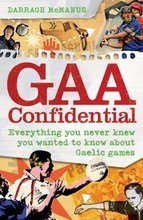
The Gaelic Athletic Association is one of the most successful and vibrant amateur sports bodies in the world, and has been a seminal influence on Irish life since its inception in 1884. In the face of official and casual hostility, poverty and mass emigration, infinite counter-attractions and a post-colonial inferiority complex the size of Mongolia, it has thrived, evolved and endured. It is, in many ways, the soul of Ireland.
Now cut the uileann pipes, fellas; that’s enough myth-making. The greatest thing about the GAA isn’t its rich history, or the way it continues to keep alive our indigenous culture in the face of a McGlobal onslaught. No – the GAA is great because it’s a living, breathing, vital part of the everyday life of hundreds of thousands of people, on this island and abroad. On an individual, community and national basis, we determine ourselves primarily through our connection to this enormous latticework of like-minded souls. I mean, if I had to choose between Ireland winning the World Cup and my county winning even a provincial title, I’d choose the latter any time.
Someone once told me that, should he be interviewing two job candidates of equal capabilities and experience, he would almost certainly give the position to whichever of them was a ‘good GAA man.’ (If they’re both good GAA men, you throw a contract in the air and let them fight for possession by the filing desk.)
And I can totally dig that. Growing up, I metered my year around playing matches, going to matches, waiting for the next season. The intercounty championship completely defined the summer for me, and still does to a large extent. My lifelong ambition, once I realised I’d never actually captain a team to an All-Ireland, was to sponsor the county jersey with the logo of my wildly successful movie production company. Which, you know, I’m still hopeful of if that bastard Scorcese ever returns my email.
The GAA is more than a sporting organisation. It’s cultural, it’s social, it’s political, it’s spiritual; hell, it’s metaphysical if you’re inclined to think that way. And best of all, it’s the most hugely welcoming body of people I’ve ever encountered, which would explain how an ungrateful little punk like me can affectionately poke fun at it for 230 pages and get away with it.
GAA Confidential is my homage to everything that makes the GAA special: the games, the people, the excitement and fun, the triumphs and disasters, the momentous and the ridiculous.
Cumann Luthchleas Gael abú!
Now cut the uileann pipes, fellas; that’s enough myth-making. The greatest thing about the GAA isn’t its rich history, or the way it continues to keep alive our indigenous culture in the face of a McGlobal onslaught. No – the GAA is great because it’s a living, breathing, vital part of the everyday life of hundreds of thousands of people, on this island and abroad. On an individual, community and national basis, we determine ourselves primarily through our connection to this enormous latticework of like-minded souls. I mean, if I had to choose between Ireland winning the World Cup and my county winning even a provincial title, I’d choose the latter any time.
Someone once told me that, should he be interviewing two job candidates of equal capabilities and experience, he would almost certainly give the position to whichever of them was a ‘good GAA man.’ (If they’re both good GAA men, you throw a contract in the air and let them fight for possession by the filing desk.)
And I can totally dig that. Growing up, I metered my year around playing matches, going to matches, waiting for the next season. The intercounty championship completely defined the summer for me, and still does to a large extent. My lifelong ambition, once I realised I’d never actually captain a team to an All-Ireland, was to sponsor the county jersey with the logo of my wildly successful movie production company. Which, you know, I’m still hopeful of if that bastard Scorcese ever returns my email.
The GAA is more than a sporting organisation. It’s cultural, it’s social, it’s political, it’s spiritual; hell, it’s metaphysical if you’re inclined to think that way. And best of all, it’s the most hugely welcoming body of people I’ve ever encountered, which would explain how an ungrateful little punk like me can affectionately poke fun at it for 230 pages and get away with it.
GAA Confidential is my homage to everything that makes the GAA special: the games, the people, the excitement and fun, the triumphs and disasters, the momentous and the ridiculous.
Cumann Luthchleas Gael abú!
- Click on the links on the right to read some of the book, then haul ass to the nearest bookshop and put some money into my bank account by purchasing a copy or ten. I thank you.






